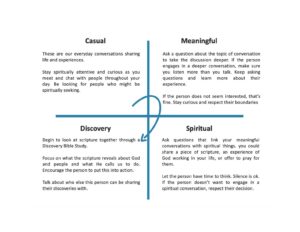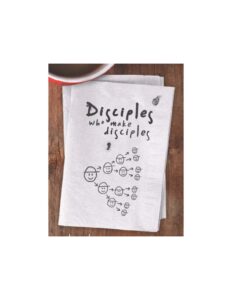Turning the World Upside Down – One or Two People at a Time
First century disciples were accused of “turning the world upside down!” (Acts 17:6, ESV). I love it! I love a good “change-the-world” challenge! But I also have to admit, at times it sounds like an overused theme from a high school graduation speech. Can one person really change the world? Can just a few people really change the world? Jesus did! The disciples did! For more than 2,000 years people’s worlds have been turned upside down (rather, set right side up) as they have discovered Jesus Christ and the life He offers them.
God invites us to join Him as He continues to turn people’s worlds upside down — from the very first, Jesus said to those He called to be disciples, “Follow me, and I will make you fishers of men” (Matthew 4:19, ESV) to His great commission He left us with before He ascended, “Go therefore and make disciples of all nations, baptizing them in the name of the Father and of the Son and of the Holy Spirit, teaching them to observe all that I have commanded you” (Matthew 28:19-20, ESV).
First, I believe it’s simply about obeying Jesus’ clear command.
Second, I believe Jesus left us simple steps to follow. Our part is not easy, but I do believe it is much simpler than we make it out to be.
Join the Conversation!
An important aspect of making disciples is finding them in the first place. We are often good at “casual” or “shallow” chit-chat, but our challenge is to take these conversations from casual to meaningful, from meaningful to spiritual, and from spiritual to discovery. This can be a bit intimidating, but if you approach your interactions with spiritual intent and genuine interest and love, you will meet people whom God is already in conversation with (drawing to Himself) and He will invite you to join the conversation.
A good example of this is found in John 4:4-26, when Jesus encounters the woman at the well. Here we see Jesus take the conversation with the woman from casual (needing a drink of water), to meaningful (talking about living water), to spiritual (springs of water welling up to eternal life). In each transition, Jesus used a statement or question to see if the woman was open to going deeper.
These statements led the woman to discover truth, to discover Jesus. Rather than Jesus telling the woman who He was and why she should follow Him, He engaged her in a spiritually intentional conversation that allowed her to discover Him for herself. Her world was turned upside down!
Remember, it is God’s role to prepare people’s hearts to hear and respond to Him – it is simply our role (blessing!) to join Him in the conversation.
Conversation Quadrants is a tool I have found quite helpful. It is a simple framework to help us be more intentional in our conversations.
I had had plenty of casual conversations with my nephew. We enjoyed talking to each other and had lots of laughs. It was fairly easy to turn the conversations to meaningful as we talked about family and his young adult life experiences. When he shared with me his intentions to get married, it provided me the opportunity, with his permission, to share God’s intention for marriage as well as the gospel. His rejection of the gospel was the most respectful and honest I’d ever encountered. (Most likely due to the relationship we had developed.) I invited him to leave the door open for possible future spiritual and discovery conversations.
About six months after I had shared the gospel with him, he reached out to me asking if I would get him started reading the Bible because he wanted to consider God further. We did Discovery Bible Study together through the Gospel of John…21 weeks through 21 chapters. Then, without any prompting from me, he prayed confession of sin and thankfulness for God’s love and Jesus’ sacrifice. I asked him why he hadn’t trusted Jesus months ago when I shared the gospel with him. He said he guessed he couldn’t put his trust in someone he didn’t know, but once he discovered for himself who Jesus was, he knew he could trust Him.
Now imagine God has led you to join in the conversation with one, two, maybe even three people who are interested in discovering who He is. Now what? What will you do when you sit down once a week with those you are leading to discover Jesus? Let me offer a simple approach to reproducible disciple-making.
Make Disciple Makers!
C.A.L.L.E.D. is a simple, reproducible, and transformational process for disciple-making. It describes a flow for disciple-making conversations and emphasizes our role as equippers and disciplers. There’s nothing new under the sun concerning the elements of this process, but the way each element is arranged and work together for a transformational experience is quite remarkable.
The C. A. L. L. describe the flow of conversation during a regular meeting with the person or persons you’re discipling through the discovery process.
- C is for Celebrate. Start with celebrating what the Lord has done in you, around you, or through “Rejoice in the Lord always; again I will say, rejoice” (Philippians 4:4, ESV).
- A is for Accountability. The goal of accountability is to encourage the disciple(s) as they strive to be faithful to what they’ve heard the Lord tell them to obey. “Let us consider how to stir up one another to love and good works” (Hebrews 10:24, ESV).
- L is for Learn it. Use a Discovery Bible Study together, giving the Holy Spirit room to “Teach you all things and…bring to your remembrance all that I have said to you” (John 14:26, ESV). What a joy this part is! Taking time to discover what a passage of Scripture reveals about God and people and what it means.
- L is for Live it. This is where the disciple learns to be still and wait, listening to discern the Spirit’s leading. This is the most important part of the process, so don’t rush it. The disciple will listen to the Lord and write down what his or her faithful response to the passage will look like. “My sheep hear my voice, and I know them, and they follow me” (John 10:27, ESV).
Each of these stops along the C.A.L.L. path of conversation presents wonderful times of prayer!
The E. and D. emphasize our role in the context of a genuine relationship with those we disciple.
- E is for Equipper. We want to equip others with experiences, skills, and tools for their journey with Jesus and their journey of discipling others.
- D is for Disciple. Our role as a disciple is to come alongside the other person(s) in a life-on-life relationship always encouraging them to become more like Jesus.
Maybe the most effective way to turn the world upside down is to multiply disciples, but I don’t know if many Christians and churches are clear on what multiplication actually means. The difference between adding and multiplying disciples is like this: if you make disciples, that is addition. If you make disciples who make more disciples, that is multiplication.
Jesus made disciple-makers. He spent three years training 12 men, and then He commissioned them to go out and reproduce the process with others. Jesus’ disciples started making more disciples who made more disciples. Jesus started the Church to be a movement of multiplication so that the Church would grow exponentially as described in 2 Timothy, “What you have heard from me in the presence of many witnesses entrust to faithful men, who will be able to teach others also” (2 Timothy 2:2, ESV).
We need as many disciples as possible to start not only making, but multiplying, disciples. That means me! That means you! Here is the million-dollar question: Are you currently investing in a handful of disciples? If you’re not, start investing in disciples and potential disciples around you.
We need as many churches as possible to be disciple-making churches. A church with a discipleship program is not necessarily the same as a disciple-making church. We need churches that are helping untrained seekers become fully trained disciples who go out into the world to multiply disciples.
Let’s you and I accept God’s invitation to join Him and turn our world upside down!

by Darryl Evetts
Multiplying Churches Core Strategy Director


